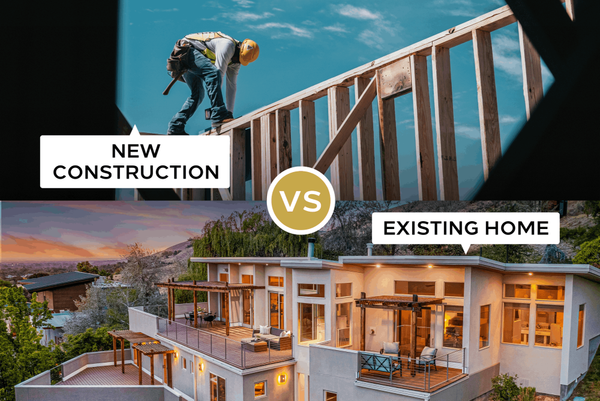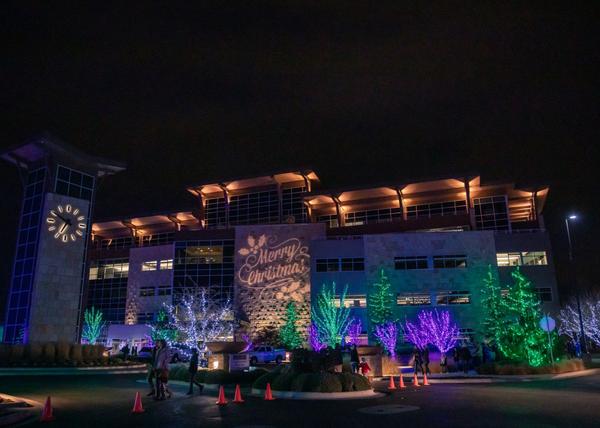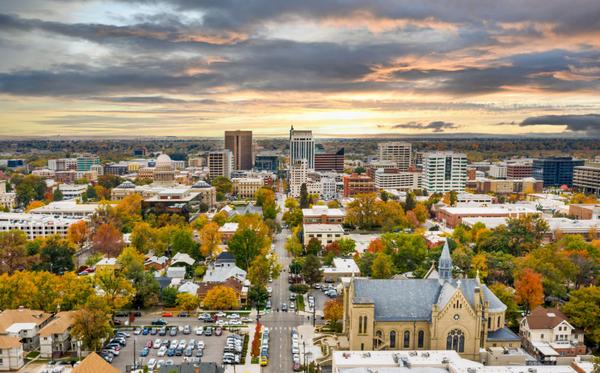Be a Boise Insider
Receive weekly updates, luxury listings, and insider tips on Boise real estate right to your inbox.

The Pros and Cons of New Construction vs. Existing Homes
When you are thinking about buying a home, a major decision is whether you want to build a brand-new home or buy an existing home. Both options bring a unique set of advantages and challenges, and it is important to think about which best fits your lifestyle and needs. Check out this guide to the benefits and downsides of both new construction and existing homes to help you decide which is suited for you! New Construction: Benefits: Modern and customizable floor plans. When buying a new home, you may have the option to pick or even design your own floor plan, making your home perfect for your needs. Even if the home is already complete when you buy it, it will likely have a modern layout that is more open. Smart Tech and Energy Efficiency. New builds are typically built with adaptability to “smart” tech, such as speaker systems, alarms, lighting, and heating and air systems. These newer appliances are often much more energy efficient, leading to a lower utility bill and greater ease of use. Low Maintenance and Warranties: Because everything in the home (electricity, pipes, roofing, etc) is brand new, maintenance costs are likely to be very low for the first few years. Some builders also offer warranties on different parts of the home, further decreasing maintenance costs for a homeowner. New Construction Communities. Recently built neighborhoods, such as Harris Ranch or Cartwright Ranch, may offer community amenities. Whether this is a neighborhood pool, pickleball court, or park, this is definitely a pro to new construction communities. Downsides: Higher Price. New construction is usually more expensive than a comparable resale home due to current material and labor costs. Risk of Delays. In the case of building a home or buying a home during construction, there is the possibility of delays in the completion of the home. However, this is not the case when buying a new, finished home. Existing Home: Benefits: Move-in Ready. Existing homes, as long as you are not planning a remodel, are typically ready to move into on the day of closing. Lower Price. Existing homes tend to be less expensive than new construction homes, making them often the more affordable option. Established Neighborhoods, Landscaping, and Architectural Details. Existing homes can come in long-lived neighborhoods, featuring mature landscaping and trees in both your yard and your neighbors. Existing homes can also feature unique and antique details that cannot be replicated in a new build, giving your home history and character. Downsides: Outdated Floor Plans. Depending on the build date, existing construction is likely to have a more dated floor plan, which could include lower ceilings and closed-in kitchens. Older Technology and Fixtures. When the home is not brand new, the lighting, sink, and bathroom fixtures may be aged and out of style. The home also will likely not include new appliances or technology integrated into it.This is not always the case, as different owners infuse more modern amenities into a home through remodeling and upgrading. Be aware that not all renovations are created equal, and that you need to do your due diligence to ensure that the ‘new’ stuff was installed properly and to code. Not So Energy Efficient. Due to older heating and cooling systems, or poor insulation, an existing home may not be very energy efficient. Potentially More Repairs and Maintenance. Older roofs, heating and air systems, and other aged appliances may lead to unexpected repairs in an existing home.

New Year, New Home: Resolutions for Homebuyers and Sellers
Photo Credit: Unsplash As many of us are reflecting on the previous year and looking forward to the next with our goals and ambitions in full focus, the new year seems like the perfect time to turn a new leaf. Life brings about change in many ways and a new calendar year marks the beginning of what could be. Whether you’re a first-time homebuyer, looking to combine households, and everything in between, join us as we delve into the resolutions that will pave the way for a successful and fulfilling real estate journey in the coming year. Homebuyer’s Resolutions: Create your budget. Begin your homebuying journey by taking a close look at your financial situation. Evaluate your monthly income and expenses, and give yourself a general budget for your future home. Begin saving for a down payment. Establish a clear savings goal for your future down payment. Try making a dedicated savings account and calculating what amount works for you to put aside each month. Look for opportunities to increase your savings through additional income or strategic budgeting. Get pre-approved for a mortgage. Navigate the mortgage process with confidence by researching different lenders and gathering necessary financial documents. Then, go to your chosen lender and obtain a pre-approval, giving you a clearer picture of your budget. Create a must-haves and a nice-to-have list. Imagine your dream home and write down what features are must-haves, and which would be nice to have as added amenities. Make sure to take into account your future needs, whether it’s more space for new additions to the family or a neighborhood with a good school district. Hire a real estate agent. Research and interview potential agents, and make sure they understand your budget, preferences, and timeline for a seamless homebuying experience. When choosing a real estate agent, it is helpful to look at previous client's testimonials to ensure you will have a positive experience. Sellers Resolutions: Begin preparing your home for sale. Set aside time in the new year to begin enhancing your home's curb appeal and overall presentation. Consider taking on repairing minor issues, repainting, and decluttering to make your property more attractive to potential buyers. Set realistic goals and timelines. Define clear and achievable goals for selling your home, and write down action items you can do to ensure that you reach these goals. Set a general timeline for selling your home, and make sure to leave a little room for unexpected challenges. Choose your real estate agent. When choosing your agent, start by asking friends, family, and colleagues for recommendations. Personal experiences can provide valuable insights. Use online platforms and reviews to research agents in your desired area. Make sure the agent you choose has extensive local market knowledge and experience. Declutter and stage your home. With the previous steps completed, you can get your home ready for photos and open houses by beginning to declutter, remove personal touches, and stage the home if needed.

The Future of Real Estate: Emerging Trends to Watch
Photo Credit: Doug Petersen As the new year begins, real estate continues to change and evolve to fit with technological advancements and shifting societal norms. From sustainable living to virtual tours, several trends are shaping the future of housing. Let's explore these emerging trends that are expected to leave a lasting impact on how we buy, sell, and live in our homes. Home Efficiency: Photo Credit: David FishEnvironmentally friendly living is taking center stage in the real estate landscape. As sustainability becomes sought after by buyers, “green homes” are gaining popularity. These houses incorporate eco-friendly practices, such as energy-efficient appliances, solar panels, and energy-efficient windows. These homes not only positively impact the environment, but also can lead to lower energy bills for the homeowners. Smart Features: Photo Credit: David Fish The integration of smart technologies is revolutionizing the way we interact with our living spaces. Smart homes with connected devices and automation systems offer enhanced security, energy efficiency, and convenience. These high-tech devices include thermostats that can be set on your phone, security systems that can be controlled remotely, and smart lighting throughout the house. These devices add convenience to our homes and buyers are prioritizing homes with tech built in. The future holds the promise of even more sophisticated and interconnected smart home solutions, making our living spaces comfortable and intelligent. Home Office Space: Photo Credit: Doug Petersen The rise of remote work has changed what homebuyers are looking for in their ideal homes. With an increasing number of people working from home, homebuyers now prioritize dedicated office space. The real estate industry is adapting to this shift, with builders and developers incorporating flexible and multifunctional spaces to accommodate these needs. The home is transforming from a living space to a versatile place that supports both life and work, a lingering change from the pandemic. Smaller Single Family Homes, More Townhomes, Larger Condos: Photo Credit: Tony Moody Higher mortgage interest rates and a shift in lifestyle have placed emphasis on smaller single family homes with less bedrooms. The National Association of Home builders says that the median square footage of new single family homes is 2,261, a little more than 200sf smaller than in 2015.. At the same time, renters are seeking more space to accommodate changes in remote work and more luxury amenities. Demand for luxury apartments remains intact heading into 2024, especially in retirement areas like Florida and Arizona. Natural and Native Landscaping: Photo Credit: Doug Petersen Concerns over climate change and resource availability is forcing homeowners to reconsider whether the grass is greener on the other side. Yards consisting of native/drought-tolerant plants, rock, and other hardscape are being prioritized over lush, water hungry lawns. In desert climates like Idaho, Arizona, and California, xeriscaping has been popularized and is becoming more accepted by HOAs. Rising Home Prices and Less Inventory: As demand for housing continues to surge, the real estate market is grappling with rising home prices and dwindling inventory. The National Association of Real Estate predicts home prices to rise by 2.6% in 2024. The competitive market will force buyers to act swiftly, while sellers enjoy the benefits of increased property values.
Categories
- All Blogs (284)
- 30thanniversary (1)
- activities (158)
- agents (17)
- announcement (1)
- apartment (1)
- april (2)
- architecture (3)
- art (7)
- art festival (2)
- article (1)
- august (3)
- awards (3)
- beer (4)
- biking (1)
- boise (145)
- Boiseevents (126)
- boisehousing (12)
- boiseriver (13)
- brew festival (6)
- buyers (35)
- campgrounds (1)
- camping (2)
- cars (1)
- children (22)
- christmas (4)
- cincodemayo (1)
- coffee (1)
- communities (3)
- concert (8)
- condominium (1)
- couples (3)
- development (4)
- downtownboise (60)
- downtownyproject (1)
- eagle (9)
- east boise (1)
- easter (1)
- event (11)
- fair (7)
- fall (15)
- family (1)
- familyfriendly (63)
- farmersmarket (13)
- Father's Day (2)
- fathersday (1)
- fest (5)
- festival (6)
- food (5)
- funfacts (2)
- galentines (1)
- garden (5)
- halloween (1)
- holiday (14)
- holidays (23)
- homechecklist (19)
- homeowner (2)
- hotsprings (2)
- housing (20)
- idaho (37)
- idaholife (100)
- idaholifestyle (107)
- july4th (4)
- kids (22)
- laborday (1)
- landmarks (1)
- lifestyle (88)
- listings (16)
- livelocal (49)
- Mandy (1)
- market (7)
- markettrend (1)
- marketupdate (12)
- may (2)
- memorial day (1)
- meridian (1)
- mortgage (3)
- mothersday (2)
- mountain (1)
- movies (2)
- museum (3)
- music (3)
- music festival (10)
- musical (1)
- nampa (3)
- NAR Settlement (1)
- neighborhoods (32)
- news (1)
- outdoorrecreation (88)
- outdoors (90)
- parks (44)
- pool (1)
- property taxes (1)
- ranking (1)
- realestate (48)
- realestatemarket (29)
- recreation (98)
- restaurants (27)
- run (1)
- sellers (35)
- september (3)
- shoplocal (25)
- shops (36)
- spring (6)
- st patrick's day (1)
- summer (15)
- team (2)
- thanksgiving day (3)
- thingstodo (157)
- tips (100)
- trails (1)
- treasure valley (9)
- trends (7)
- valentines (2)
- waterpark (1)
- wine (5)
- winery (9)
- winter (17)
Recent Posts


















